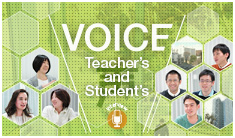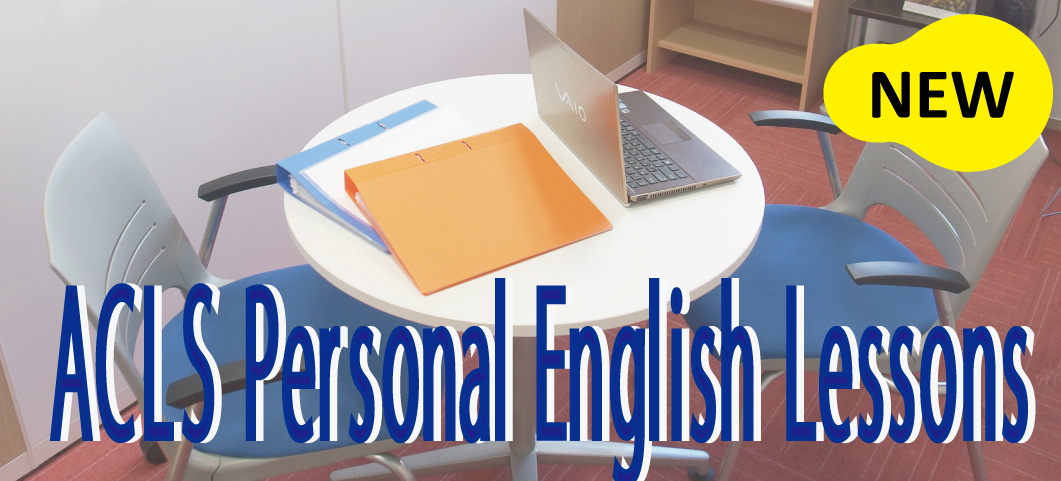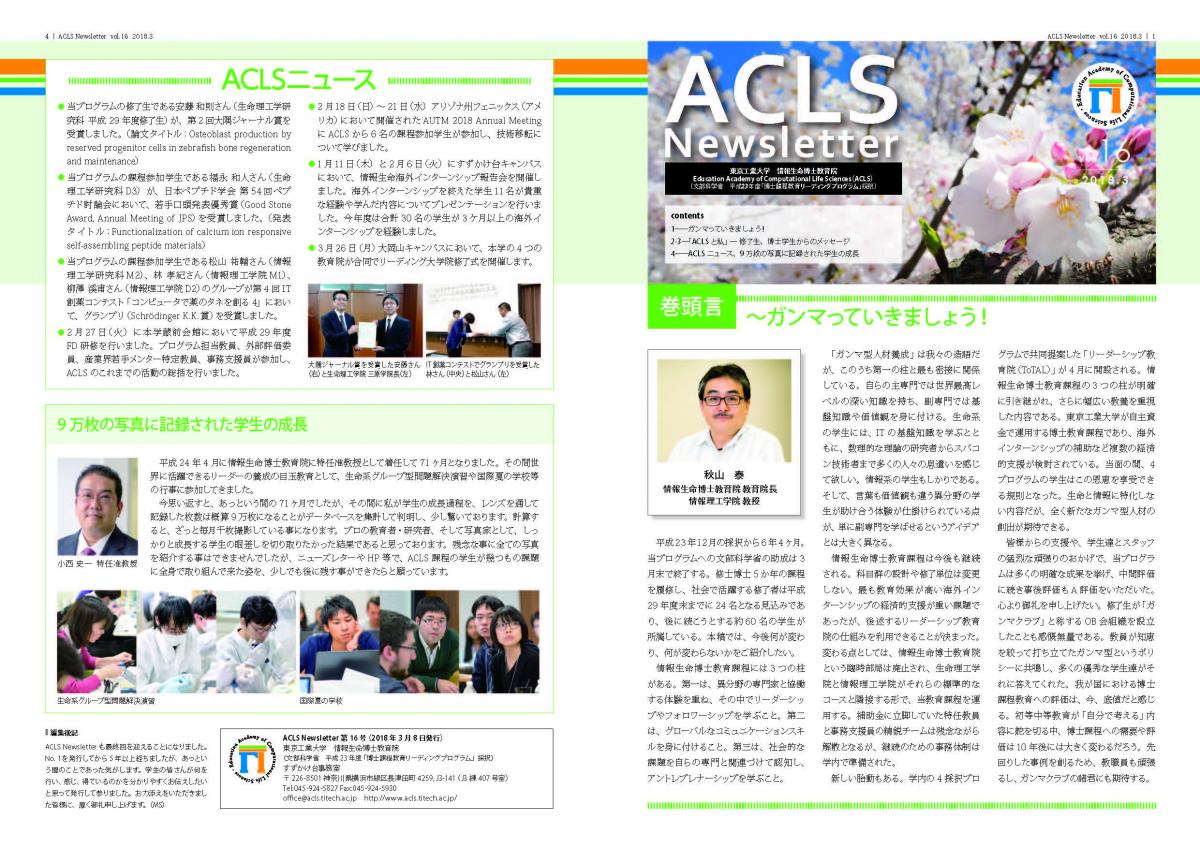- Home
- Teacher's and Student's voice
- Yoshinori Mizuguchi / Shoya Yasuda
Yoshinori Mizuguchi / Shoya Yasuda


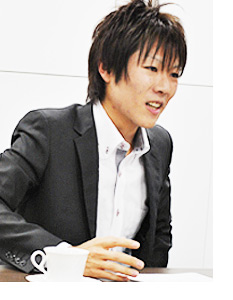 Mizuguchi: There are many problems in the world today, such as the global environment and the food problem. Among them, I am especially interested in the field of health. If all people were healthy, the world would be a better place. That is my thinking. Before, I was researching medicine for treating viruses. Now, my topic of research is regenerative medicine, and it is my aim to create three-dimensional organs and tissues.
Mizuguchi: There are many problems in the world today, such as the global environment and the food problem. Among them, I am especially interested in the field of health. If all people were healthy, the world would be a better place. That is my thinking. Before, I was researching medicine for treating viruses. Now, my topic of research is regenerative medicine, and it is my aim to create three-dimensional organs and tissues.
I wanted to make every person healthy through my research, but I felt that I didn’t have enough tools in my arsenal yet for innovation. That was what motivated me to come to ACLS. Innovation would be possible only if I were to acquire knowledge of other disciplines and fuse them together with the knowledge of life science. I felt that I needed the knowledge and techniques of information science that could be gained at ACLS.
Yasuda: Partly due to the fact that my father was a cancer researcher, I had been interested in the world of science since I was young. I had a vague idea that I wanted to get a Ph.D., but what I wanted to be was different from the traditional “Ph.D.” figure. Instead of just having high expertise on one theme, I wanted to become someone with a wide-angle view of various subjects. Great men who changed the world in their time were persons who were proficient at so many things: a physicist, an astronomer, an architect and more, all at the same time. I wanted to become a proficient person as well—an all-around person, in a way.
To accomplish that goal, I would need more than just professional knowledge, but a viewpoint including other fields, at least enough to become involved in a discussion with someone in a different discipline. The ACLS program focuses on such interdisciplinary integration. I thought this is where I would be able to find what I need. That was my reason for joining ACLS.

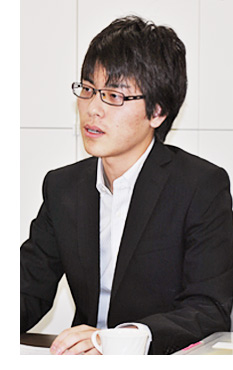 Mizuguchi: What makes me really glad that I came to ACLS is that there are many opportunities made available for taking on new challenges. Of course, lectures and courses are substantial, as well, for example, courses of English aimed at cultivating competence in global communication. In addition, there are forums and many other events.
Mizuguchi: What makes me really glad that I came to ACLS is that there are many opportunities made available for taking on new challenges. Of course, lectures and courses are substantial, as well, for example, courses of English aimed at cultivating competence in global communication. In addition, there are forums and many other events.
One of the opportunities I otherwise would not have had was the chance to participate in the “Leading Forum” (Note 1). Outstanding students from all over Japan assembled there, and I learned a lot from discussions with students in a wide array of disciplines from other universities. I could say the same about the “Student Meeting of Leading Graduate Schools” (Note 2). I was able to meet and converse with students, not only from among life sciences and information sciences, but beyond the barrier that separates the sciences and the arts. In discussing fields I didn’t know about, I gained knowledge. When I face a problem, this would now lead me to think, “I can ask that person about this.” Also, I would be able to offer suggestions based on the knowledge that I have. I came to think about “I think I would be able to work as a team with that person.” It was a good stage for communication. A wonderful feature of ACLS is that we have opportunities to attend such events.
Yasuda: There are very interesting classes and lectures, for example, “Creative Collaboration Works II.” We choose one theme we are interested in from the six given, form a team with students from another discipline, and work to solve the problem. I chose the theme about acquisition and analysis of human vital information. Circuit design and programming was difficult for me as a life science major, but we cooperated and shared responsibilities to accomplish the creative task of forming music out of pulse waves.
Like Yoshinori, I feel that a wonderful feature of ACLS is that we have many opportunities to participate in events and meet different people. Nowadays, even science has become compartmentalized, and no one can do everything by himself. It is necessary to form teams with other people and cooperate. I think it’s great that ACLS provides many opportunities for such communication.
The aim of the Leading program is to foster professionals needed to solve ever-complex social problems—people not limited to their chosen discipline, but a leader who can grasp the whole picture of an issue. The Forum was held to enable students and instructors involved in the program to all gather to exchange opinions and information. The event for 2014 was held in January, in Umeda, Osaka.
(Note 2) The Second Student Meeting of Leading Graduate Schools
An event held at Kumamoto University in June 2014. With “Ph.D. and Employability” as its theme, workshops were held, including a discussion in the World Café format.

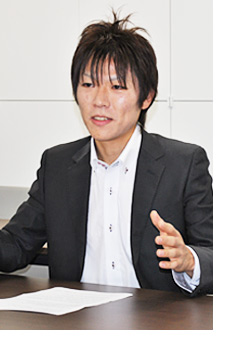 Mizuguchi: I participated in this year’s “Summer School” (Note 3) as chairman of the executive committee (in charge of Group Work). I had decided to challenge myself to many things when I joined ACLS. I felt that the executive committee chairman position was one of those challenges. What drew me was the rare chance to become the person overseeing all the organization.
Mizuguchi: I participated in this year’s “Summer School” (Note 3) as chairman of the executive committee (in charge of Group Work). I had decided to challenge myself to many things when I joined ACLS. I felt that the executive committee chairman position was one of those challenges. What drew me was the rare chance to become the person overseeing all the organization.
Yasuda: In this Summer School, I took on the role of vice chairman of the executive committee (in charge of Cultural Exchange). I wanted to gain experience in proceeding with a rather administrative skill of creating minutes of the meetings. Being cooped up in a research laboratory rarely offers a chance to sum up what happened in a meeting and to organize it into minutes.
Mizuguchi: This year’s Summer School had about 50 participants—about 40 from ACLS, and about 10 from universities overseas, including Purdue University, the host school. We developed the event to include a keynote lecture, group work, and a poster session. I think each section was successful overall. We received positive feedback from the survey after the conclusion of the event. I was a little concerned about some things, for example, that the theme for the group work “the structure and function of proteins” may have been a bit biased toward life science, but it must have been a good opportunity for students in the information field to acquire new knowledge about a field they don’t know much about.
Yasuda: There were many things I gained by participating in the operation of the event. Making the minutes was difficult at first, but I became used to it. Now, how to write emails to instructors and how to plan and act to meet deadlines come more naturally to me. It was a lot of work, but it was very much worth the challenge.
(Note 3) Summer School (International Summer School)
ACLS International Summer School is a program arranged by ACLS to facilitate discussion and interaction with researchers and students in diverse disciplines. In 2014, it was held at Purdue University in the U.S.A. from August 13 to 18.

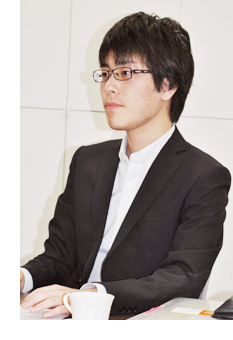 Yasuda: I’ve never felt it to be a burden or a difficulty. Of course, I need to make the time to participate and prepare for the ACLS programs. However, graduates have fewer classes than undergraduates to begin with, so we can manage the time. I think one reason that I don’t feel burdened is that I don’t need to commute for the program (it is all on the Suzukakedai campus). Presently, many classes can be taken remotely, so I don’t think the situation would be much different for students participating from the Ookayama campus.
Yasuda: I’ve never felt it to be a burden or a difficulty. Of course, I need to make the time to participate and prepare for the ACLS programs. However, graduates have fewer classes than undergraduates to begin with, so we can manage the time. I think one reason that I don’t feel burdened is that I don’t need to commute for the program (it is all on the Suzukakedai campus). Presently, many classes can be taken remotely, so I don’t think the situation would be much different for students participating from the Ookayama campus.
Mizuguchi: I feel the same. I set aside time for my research, and have been able to report in my laboratory just as much as other students (who are not involved with ACLS). For us, it has become something normal. Even in ways not directly related to my present research, participating in ACLS gives me the chance to interact with people from other disciplines and other cultures. There is even a possibility that we may team up with such people we’ve met now in the future. If we look at it that way, it’s much more interesting than it is hard work.

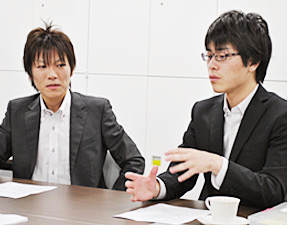 Yasuda: I think the only options after graduate school used to be to stay in the laboratory in the academic world, or to join a company as a researcher. I joined ACLS because I wanted to be, to become, a professional who could change such norms. I want to be a kind of “new Ph.D.” —one who is a researcher but also has an element of a businessperson, and is constantly showing the world the results of his research. I think being a part of ACLS is helping me to make that goal take shape.
Yasuda: I think the only options after graduate school used to be to stay in the laboratory in the academic world, or to join a company as a researcher. I joined ACLS because I wanted to be, to become, a professional who could change such norms. I want to be a kind of “new Ph.D.” —one who is a researcher but also has an element of a businessperson, and is constantly showing the world the results of his research. I think being a part of ACLS is helping me to make that goal take shape.
Mizuguchi: I think the goal of the ACLS program is to foster professionals who will lead Japan and change the world. I personally plan to become such a professional, and this program has given me the enthusiasm to feel, “Come, let us go lead Japan!”
One of the possibilities I am considering is founding my own business. In this “stage” provided by ACLS, I was able to meet many different people. I could start a company with them. Of course, I will continue my research, but I would also like to work with society, as well.
Yasuda: ACLS is not a huge organization towering above us, as if it will draw us up if we become its members. I think it is more of a foundation below us. Many opportunities are made available, so that we can grow ourselves by making use of them. Because of this, I think there is no use in joining just for the sake of joining. It is well-suited for students who have something vaguely in mind about who they want to become and what they will do in the future. I hope such students will come by, look, and listen to what we have here.
Mizuguchi: Going to classes and listening to lectures—if someone’s just “in” ACLS, it’s not much different from being shut up in a laboratory. I think ACLS is for people who can make much use of the many opportunities provided. Otherwise, the chances would be just wasted.
* The contents of this article are accurate as of the date of the interview in November 2014.






